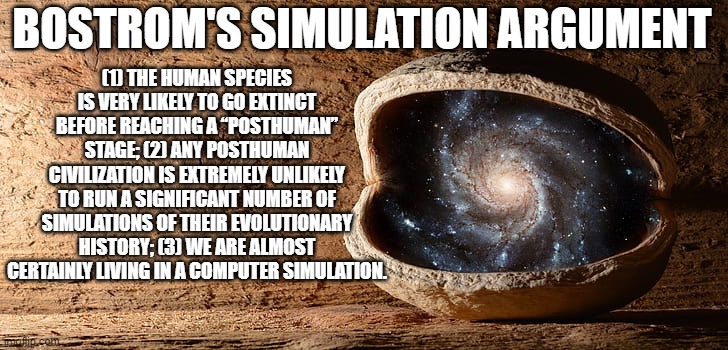


For instance, some functions of conscious minds may be impossible to simulate, just like some mathematical equations, in fact most real-world related ones, have proven impossible to solve analytically. Even our potential future brilliance considered, there could easily be insurmountable practical and theoretical problems. Furthermore, even if we overcome epistemological challenges of this sort and somehow manage to acquire knowledge about the specific physical processes that are sufficient in order for a conscious mind like our own to arise, this does not imply that we will ever be able to actually simulate such a mind. We do not know what physical processes, or “information processes,” that are necessary in order to accurately emulate our conscious minds, and it is not clear how we can come to know this in the future. Even if our minds are so-called substrate independent, meaning that they need not necessarily be implemented in neurons or any other specific material, we do not know at what level our mind emerges, or whether speaking about a single level, or just any number of levels, even makes much sense in relation to how our minds emerge. Whether we will ever run such simulations first of all depends on whether it is even possible to reliably simulate conscious minds as our own on a computer, and it is not at all clear that it is. If we really live in a simulation, how likely is it, given how many different kinds of “worlds” that can be created in a simulation, that the world in which our world is run as a simulation is anything like our own? This is, however, merely to make the same assumption again: that the simulators resemble us in the first place. This assumption is sought justified with the suggestion that a technologically advanced human civilization likely will want to simulate a world close to its own, a so-called ancestor simulation, and hence the great similarity.

What the simulation hypothesis secretly assumes is an enormous degree of similarity between the simulated world and the simulating world. For if the world we live in indeed is a simulation, then how can we know that the conclusions and worldview we may be able to reasonably draw based on what we see in this world, including conclusions about simulations, all of which is pure simulation according to the argument, have any validity beyond our own simulation? If we are living in a simulation created by simulators, what we think we can reasonably say about our simulators can easily be wrong to an unimaginable degree. While this is a strength of the argument – basing our arguments on the data we have available to us is ultimately the only reasonable thing to do – it is also one of its greatest weaknesses given what the argument is about.

It does not refer to a magical notion of purpose that is detached from what we know about it, and, furthermore, it is based on premises that can perhaps reasonably be considered plausible given what we know about the world. The first thing to note about this argument is that its premises are based on the world we observe. The argument rests upon the assumption that it will become possible to create simulated worlds with simulated, conscious people, and if such simulations will ever be made, the number of simulated worlds and people might easily outnumber the number of real, non-simulated worlds and people, and it will therefore, given that we make such simulations, be likely that we live in such a simulated world according to the argument. The simulation argument, not to be confused with the specific simulation hypothesis, states that if we are not very likely living in a simulation, it must either be likely that humanity goes extinct before we become technologically advanced enough to make such simulations, or it must be true that we will choose not to make such simulations. The simulation hypothesis was put forth by philosopher Nick Bostrom, and it states that the world we live in may be a simulation in a computer constructed by an advanced human civilization, which is to say that the world we live in is purposefully created.


 0 kommentar(er)
0 kommentar(er)
